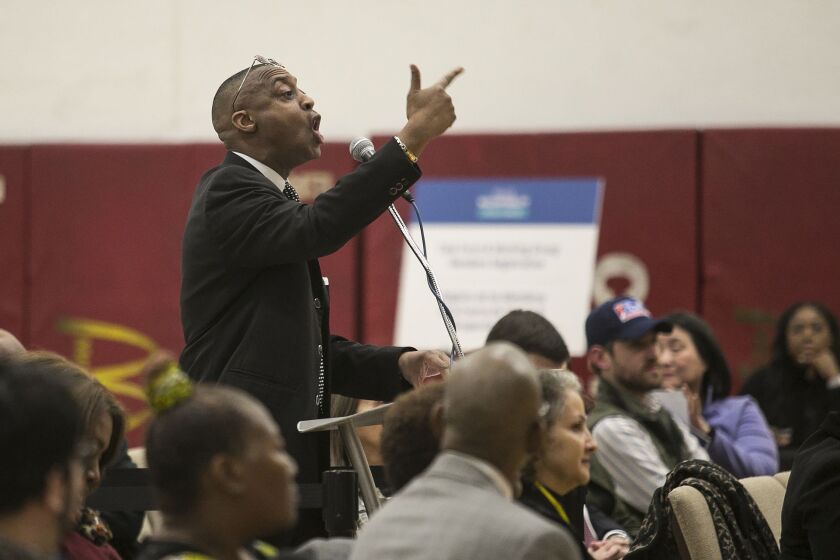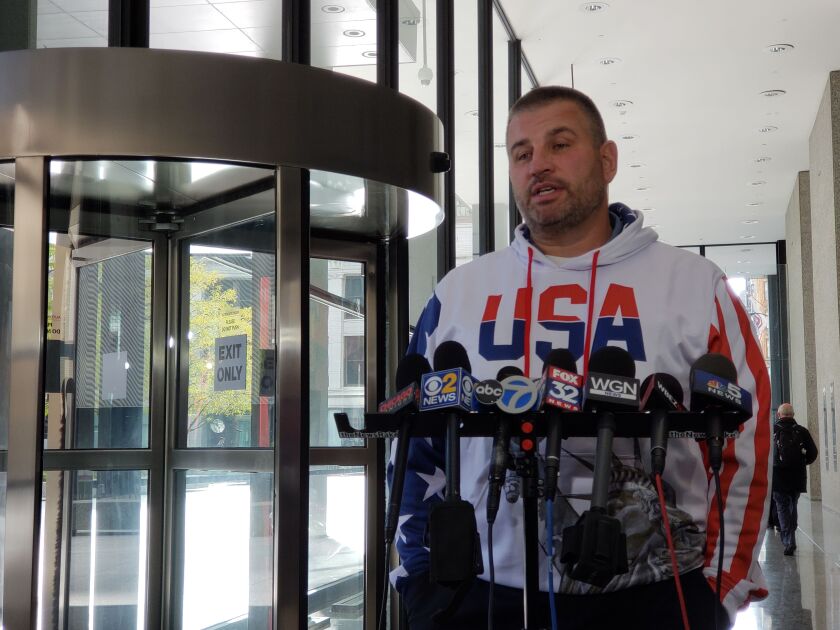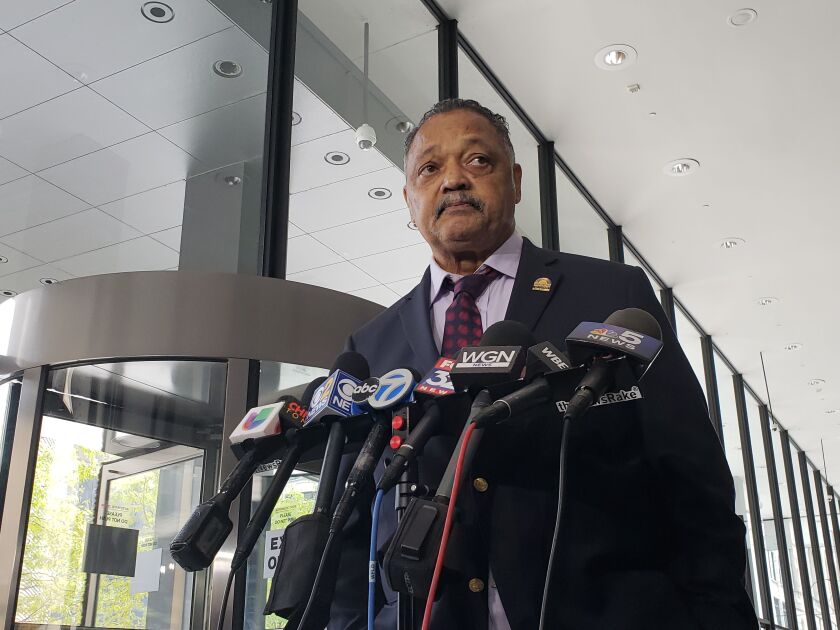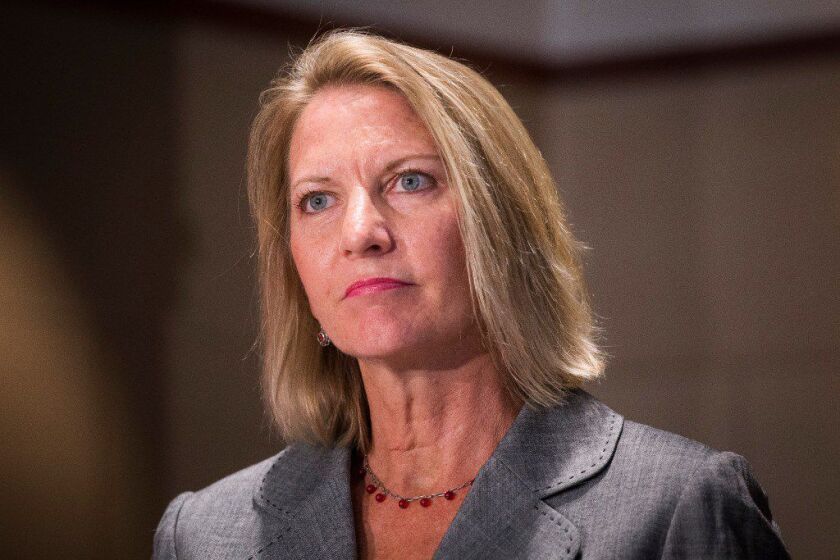3:33 p.m. Judge: ‘That’s it for the day’
The first of two days of hearings over a proposed consent decree to govern the Chicago Police Department ended at 3:28 p.m. when U.S. District Judge Robert Dow said, “that’s it for the day.”
“We will repeat the process tomorrow morning,” Dow said as he bid everyone goodnight.
2:51 p.m. Officer: ‘I want my Chicago safe. And this is not the way to do it’
A long-time Chicago police officer told the federal judge who is presiding over the consent decree hearing Wednesday that, “the majority of the people are good.”
“Unfortunately, the bad people hide among them,” Michael Garza said. “And I need the ability to stop them and to talk to them.”
Garza appeared before U.S. District Judge Robert Dow, who already heard from several people supportive of the proposed consent decree as of Wednesday afternoon. But Garza said a “piece of paper” can’t tell him how to respect people and do his job. Rather, he said the consent decree threatens to circumvent the city’s collective bargaining agreement with the police union.
He also said a decrease in manpower threatened the safety of Chicagoans and emboldened criminals.
“I want my Chicago safe,” Garza said. “And this is not the way to do it.”
1:34 p.m. The police union comes under attack by commenters on consent decree
Two speakers attacked the Fraternal Order of Police as a federal court hearing over a potential Chicago Police consent decree resumed Wednesday afternoon.
The women said they had been involved in a federal lawsuit filed in June 2017 that first sought a federal consent decree to govern reform at CPD. The hearing on Wednesday involves a separate proposal negotiated by Mayor Rahm Emanuel and Attorney General Lisa Madigan.
Maria Hernandez, a member of Black Lives Matter Chicago, insisted that the FOP shouldn’t be involved in the consent decree, complaining that “they are biased and they are only here to preserve the very institutions that we came here to change.” She also said that if police reform is not done right, “it’ll be another 50 years of the same problem.”
A second woman involved in the earlier lawsuit also said the “FOP does what it does — it stands on the outside and wants to blow the whole thing apart.”
Karl Brinson, the president of the West Side branch of the NAACP, said policing in Chicago has had a “profound psychological” impact on the black community. “We believe this consent decree is a start,” he said. “It’s a start but it has to have more teeth.”
And Curtis Delany Jr., a member of the Community Renewal Society, said, “Chicago leaders have said they will reform the police department many times but they didn’t do enough.
“We need a consent decree to make sure that the code of silence finally ends,” Delaney said.
12:00 p.m. Police officer complains that ‘everybody’s anti-police’
Members of the Chicago Police Department pushed back Wednesday morning against supporters of the proposed consent decree.
Among them was John Catanzara, who wore a jersey-style sweatshirt that said “USA” on the front and “Trump 45” on the back. He said he was disappointed that Attorney General Lisa Madigan decided to pick “low-hanging fruit and go after police.” He also complained that “the city decided they were going to join in with this and eliminate the police from any involvement whatsoever.”
Last August, U.S. District Judge Robert Dow said state attorneys had met with Fraternal Order of Police President Kevin Graham eight times and held 13 focus groups with police officers.
Catanzara said people need to learn to respect a simple, race-neutral command: “stop now.”
“It’s a simple command and it needs to be followed, and no consent decree is going to change that,” Catanzara said.
Later, in the courthouse lobby, Catanzara said he spoke for members of CPD who “could not speak for various reasons.” He complained that “everybody’s anti-police” and he called this week’s hearings a “dog and pony show” that will end up in an appellate court no matter what.
Back in the courtroom, another longtime police officer asked the judge, “where is the accountability for the criminal element?” But the Rev. Lisa Goods of Kenwood United Church of Christ said she grew up as the niece of a police chief in suburban Pittsburgh. She said he never had to use “excessive force.”
“In Chicago, the use of excessive force has become common place when it comes to black and brown bodies,” she said. “Or on the South Side. Or the West Side.”
Goods said she has had to have “the talk” with her son about “how to respond to police in order to stay alive.”
“It saddened me to have to put fear in my child of those who were supposed to serve and protect him,” Goods said.
The judge also heard from the Rev. Jesse Jackson, who invoked Chicago Police Officer Jason Van Dyke, recently found guilty of second-degree murder and 16 counts of aggravated battery for the shooting death of Laquan McDonald.
“One man cannot be the fall guy for this criminal justice collapse,” Jackson said.
10:50 a.m. ‘We need healing and hope in this city’
U.S. District Judge Robert Dow spent the first hour of Wednesday’s hearing listening to people who said a consent decree governing the Chicago Police Department would bring “healing and hope.”
But at least one man said it must “allow (police) to do their job and, most importantly, protect the citizens of the community.”
The last speaker before the judge took a 10-minute break Wednesday was an African-American pastor who told the judge how, when the security alarm at his home went off, he spent 10 minutes being questioned by Chicago police while his 14-year-old daughter watched with tears in her eyes. He also said he has to tell his 9-year-old son not to play with toy guns for fear of a “violent moment” with police.
“We cannot simply rely on big promises from politicians across our city,” he said.
Cook County Public Defender Amy Campanelli said she has seen clients who were bruised by handcuffs squeezed too tight, whose faces were cut when they were hit by an officer wearing a ring, as well as others who had been denied medicine and bathroom access by the police.
“These stories were so similar and accurate, I knew they were true,” Campanelli told the judge.
She added: “I wonder why, in 2018, witnesses and victims don’t come forward?”
“We need healing and hope in this city, and this consent decree will provide it,” Campanelli said. “I look forward to seeing that day.”
Finally, a Mount Greenwood man said police officers he knows are “fearful to do their job because they feel they’re being scrutinized.”
“Who is suffering?” he asked. “The citizens of the community.”
The man, who said he is representing himself in a pending lawsuit against CPD, said the department needs to be overseen in a “common-sense” way.
10:02 a.m. ‘An essential roadmap to achieve real and lasting police reform’
Before public speakers began making their comments, attorneys for City Hall and the attorney general’s office offered some opening comments of their own.
Cara Hendrickson, an attorney for Attorney General Lisa Madigan’s office, said that, with the proposed consent decree, “Chicago and its 163-year-old police department can effectively strengthen and improve policing.”
“It is an essential roadmap to achieve real and lasting police reform, build trust between residents and the police, and — with the court’s oversight — ensure transparency and accountability for the public,” Hendrickson said.
Still, she acknowledged the proposed decree “does not address every challenge.” City Hall attorney Allan Slagel echoed that sentiment, citing “the old saw” that “a good settlement is one that nobody likes completely.” He said that’s the takeaway from the public comments that have already been filed.
“We may have gotten things not exactly the way people would like,” Slagel said. Still, he called it “unprecedented” that a draft of the decree was released for public comment before it was filed with the court.
View this document on Scribd9:46 a.m. ‘This is really a day for me to listen,’ judge says
U.S. District Judge Robert Dow began Wednesday’s consent decree hearing at 9:37 a.m., welcoming the public to the courthouse and reminding them of the rules.
Beyond that, Dow said he had few opening remarks.
“This is really a day for me to listen,” Dow said.
The judge said 76 speaker slots have already been filled, leaving 20 slots Thursday.
9:28 a.m. More than 70 speaker slots already filled, including 47 for Wednesday
Forty-seven speakers have been chosen by lottery for the first day of the consent decree hearing. And roughly 30 have already been chosen to speak Thursday. That leaves a “limited number” of slots on the second day, court officials said.
The Rev. Jesse Jackson appears to be among Wednesday’s speakers, though his number wasn’t called until well into selection for the first day. While he waited, Jackson stood in line with several other people hoping to get a chance to speak.
8:20 a.m. Line forms early for historic consent decree hearing
People began lining up before 8 a.m. Wednesday for what could be a historic two-day hearing about police reform at the Dirksen Federal Courthouse. Among those spotted early on were Fraternal Order of Police President Kevin Graham and the Rev. Jesse Jackson.
U.S. District Judge Robert Dow is preparing to take public comment about a proposed consent decree that would govern reform at the Chicago Police Department. It was negotiated by City Hall and Attorney General Lisa Madigan’s office after a year-long Justice Department investigation found CPD had a practice of violating constitutional rights.
Madigan and Mayor Rahm Emanuel revealed a 225-page draft of the consent decree last summer. It is wide-ranging and would address virtually every aspect of policing in Chicago. One sticking point remained after it was revealed, but Emanuel and Madigan later agreed that officers would report every time they point a gun at someone.
Chicago’s Fraternal Order of Police has been sharply critical of the draft consent decree. So has the Trump Administration recently. U.S. Attorney General Jeff Sessions has argued that Chicago’s violent crime crisis would “not be solved through civil litigation, and murders of Chicagoans will not be prevented by subjecting the CPD and its officers to multiple, costly monitors through various settlement agreements and consent decrees.”
Earlier this week, Dow laid out his rules for what could turn out to be a carefully choreographed hearing.
The hearing will be held Wednesday and Thursday in the ceremonial courtroom on the 25th floor of the Dirksen Federal Courthouse, 219 S. Dearborn. It will run from 9:30 a.m. to 3 p.m. both days. Courtroom doors will open at 8:45 a.m., and seats will be available on a first-come, first-served basis. People who leave the courtroom will forfeit their seats and may not reserve them with coats, backpacks or other articles, according to Dow’s order.
Anyone who wants to speak at the hearing must register with an approved form of identification. Because a limited number of five-minute speaker slots will be available, the judge plans to use a lottery system to decide who gets to speak, and in what order.
Clerk employees will register potential speakers outside the courtroom and issue lottery numbers between 7 a.m. and 8:30 a.m. Wednesday. Lottery numbers will be drawn at 8:30 a.m., and a list will be generated to determine speaking order.
Potential speakers may only register for themselves, according to the order. They may not register an organization or another person.
If more people register on Wednesday than can be accommodated that day, the clerk’s office will issue slots on Thursday to people who entered the Wednesday lottery. If Wednesday’s speaker slots are not filled, the same lottery process will be repeated Thursday.
Any person turned away will be allowed to submit written remarks no later than Nov. 2.
“It is expected that any such submissions will not exceed the length of comments that could be delivered orally in 5 minutes,” the order states.
Registered speakers will be assigned seats in the courtroom. After the speakers have made their remarks, they will eventually be asked to leave their seats so another round of speakers may be accommodated.
Overflow seating will be made available in Courtroom 2503, where audio and video of the hearing will be transmitted.
The consent decree hearing is part of the ripple effect from the Oct. 20, 2014, shooting death of 17-year-old Laquan McDonald by Chicago Police Officer Jason Van Dyke. It comes a few weeks after Van Dyke’s conviction on second-degree murder and aggravated battery charges in the shooting.
Check back here throughout the day for live updates.









